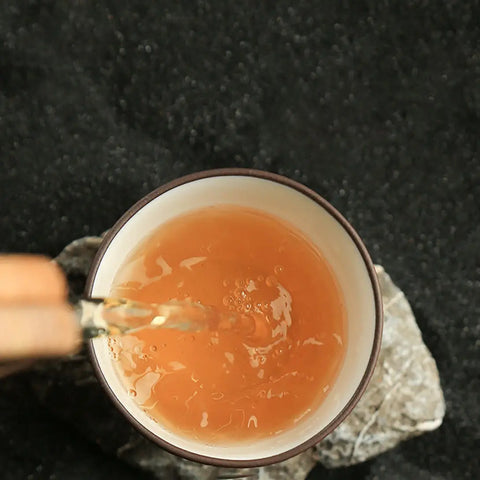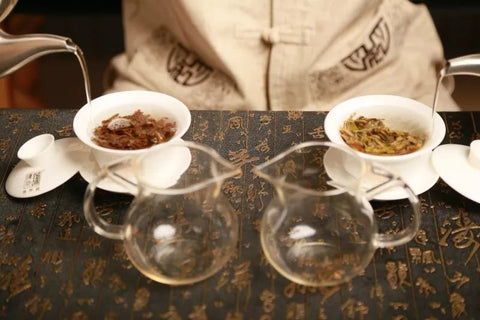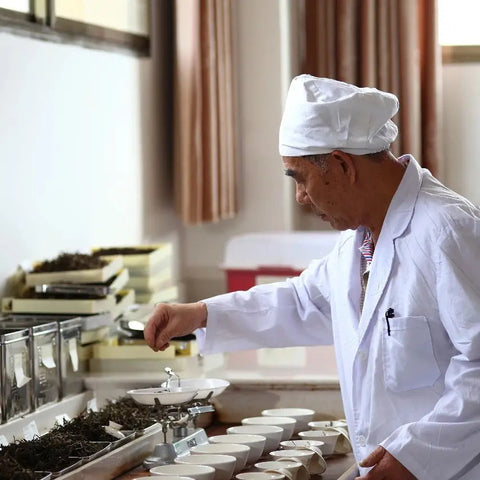What Happens If You Steep Tea Too Long
Tea steeping is the process of soaking tea leaves in water to extract their flavors and aromas. It's a fundamental step in preparing any type of tea.
Different teas require different steeping times and temperatures. For example, green tea typically steeps at 175°F (80°C) for 2-3 minutes, while black tea steeps at 212°F (100°C) for 3-5 minutes.
| Tea Type | Temperature | Time |
|---|---|---|
| Green Tea | 175°F / 80°C | 2-3 minutes |
| Black Tea | 212°F / 100°C | 3-5 minutes |
| White Tea | 160°F / 70°C | 4-5 minutes |
| Oolong Tea | 195°F / 90°C | 4-6 minutes |
| Herbal Tea | 212°F / 100°C | 5-7 minutes |
Water quality is another essential factor. Use fresh, filtered water for the best results. Avoid using distilled or previously boiled water as it can affect the taste.
Bestsellers
Equipment like teapots, tea infusers, and kettles can also impact the steeping process. Glass and ceramic teapots are ideal as they maintain heat well and don’t alter the tea's flavor.
Steeping ratios are crucial. A common ratio is one teaspoon of tea leaves per cup of water. You can adjust this ratio according to your taste preferences.
Always cover your tea while it's steeping. This keeps the heat consistent and ensures even extraction.
Consequences of Over-Steeping Tea
When you steep tea for too long, several changes can occur that may affect your overall tea experience. The flavor profile of the tea shifts significantly, often becoming overly bitter and astringent. This can be quite unpleasant, particularly if you prefer a more balanced and mellow taste.
Over-steeping releases more tannins into the tea, compounds responsible for bitterness. These tannins can also cause a dry, puckering sensation in your mouth. If you're sensitive to these compounds, it might lead to discomfort.
Another effect of over-steeping is the potential increase in caffeine content. If you're trying to limit your caffeine intake, this might be a concern. Over-steeping can cause higher caffeine concentration compared to a properly steeped tea.
Additionally, the color of the tea may change, becoming darker. This can be visually unappealing if you prefer the lighter hues of correctly steeped tea.
Nutrient loss is another potential issue. Prolonged steeping might lead to the breakdown of some of the beneficial compounds in tea, reducing its health benefits.
Overall, the taste, appearance, and potential health benefits of the tea can all be negatively impacted by over-steeping.
| Factor | Impact of Over-Steeping |
|---|---|
| Flavor | Bitter, astringent |
| Tannins | Increased release, causing dryness |
| Caffeine | Higher concentration |
| Color | Darker, less visually appealing |
| Nutrients | Possible breakdown, reduced health benefits |
To enjoy your tea at its best, pay attention to the recommended steeping times and temperatures.
Optimal Tea Steeping Times

Different types of tea require specific steeping times to achieve the best flavor and aroma.
Lao Ban Zhang
Green Tea
For green tea, steep 1-3 minutes. Using water around 160-180°F (70-80°C) maintains its delicate flavors.
Black Tea
Black tea should steep for 3-5 minutes. Boiling water at 212°F (100°C) works best.
White Tea
Steep white tea for 4-5 minutes at a lower temperature of 160-185°F (70-85°C).
Oolong Tea
Oolong tea benefits from 3-5 minutes of steeping at 185-205°F (85-96°C).
Herbal Tea
Steeping herbal tea for 5-7 minutes is ideal. Use water at 212°F (100°C).
Summary Table
| Tea Type | Steeping Time | Water Temperature |
|---|---|---|
| Green | 1-3 minutes | 160-180°F (70-80°C) |
| Black | 3-5 minutes | 212°F (100°C) |
| White | 4-5 minutes | 160-185°F (70-85°C) |
| Oolong | 3-5 minutes | 185-205°F (85-96°C) |
| Herbal | 5-7 minutes | 212°F (100°C) |
Following these guidelines ensures your tea tastes its best. Adjust according to personal preference for a perfect cup.
Impact on Flavor Profile
When you steep tea too long, the flavor profile changes significantly.
Bitterness is one of the first noticeable changes. Prolonged steeping extracts more tannins, which are substances that can make the tea taste harsh.
Another impact is the astringency. Tea can become very astringent, making your mouth feel dry or puckered.
In addition, steeping too long can lead to a loss of the subtle notes. Floral, fruity, or earthy flavors may get overshadowed by the dominating bitterness.
Here's a simple table to illustrate some key changes:
| Flavor Element | Short Steep | Long Steep |
|---|---|---|
| Bitterness | Low | High |
| Astringency | Low | High |
| Subtle Notes | Prominent | Faded |
Aroma is another aspect affected. Over-steeped tea can lose its delightful fragrance and smell strong or overpowering.
The tea's color also darkens with prolonged steeping. While this might make it look richer, it usually signals a more intense and sometimes unpleasant taste.
By steeping your tea for too long, you're likely to miss out on the balanced and nuanced flavors that characterize a well-prepared cup.
Effects on Caffeine and Antioxidants

Steeping tea for too long increases the caffeine content in your cup.
Caffeine Levels:
- A short steeping time (1-3 minutes) results in less caffeine.
- A longer steeping time (5 minutes or more) increases caffeine levels.
Antioxidant properties are also affected by steeping time.
Antioxidants:
- Shorter steeping times may not fully release antioxidants.
- Longer steeping allows more antioxidants to be extracted.
Balancing steeping time can help you achieve the desired levels of caffeine and antioxidants in your tea.
Potential Health Risks
Steeping tea too long can lead to an increased concentration of caffeine. Consuming high levels of caffeine may cause jitters, anxiety, and insomnia. If you are sensitive to caffeine, monitor your tea-steeping time carefully.
Prolonged steeping can elevate tannin levels in your tea. Excessive tannins can cause stomach irritation and reduce the absorption of essential nutrients like iron. If you have a sensitive stomach or are prone to iron-deficiency, this is particularly important.
Higher concentrations of certain substances, such as fluoride, may also result from over-steeping. While fluoride has dental benefits, excessive intake can pose health concerns, especially for those with fluoride sensitivities. Moderate your steeping time to avoid this risk.
Some teas might release higher levels of oxalates v when steeped for too long. High oxalate levels are linked to kidney stone formation. Keep this in mind if you are at risk for kidney stones.
Always steep your tea within the recommended time to minimize these potential health risks.
Guidance for Perfect Tea Steeping

Aim for a water temperature that suits the tea type. For green teas, use water at 160-180°F (70-80°C). For black teas, 200-212°F (93-100°C) is suitable.
Use fresh, cold water for boiling. Avoid reboiling water as it results in flat-tasting tea.
Use the right amount of tea. Typically, one teaspoon (about 2 grams) per 8-ounce cup. For loose leaf teas, adjust to personal taste.
Steeping time is crucial:
- Green tea: 1-3 minutes.
- Black tea: 3-5 minutes.
- Herbal tea: 5-7 minutes.
Use a timer to avoid over-steeping.
Consider a tea infuser or filter for loose leaf tea.
Tip: Preheat your teapot or cup by rinsing it with hot water before adding tea.
Follow these steps for a flavorful cup.
Troubleshooting Common Steeping Mistakes
Over-Steeping: If your tea becomes too bitter, you may have steeped it too long. To fix this, reduce the steeping time. For example, black tea often needs just 3-5 minutes.
Water Temperature: Using water that is too hot can burn the leaves. Use the following guidelines:
- Green tea: 160°F - 180°F
- Black tea: 200°F - 212°F
- Herbal tea: 212°F
Tea Quantity: Overloading your teapot with too many leaves can intensify bitterness. Use about 1 teaspoon per 8 ounces of water for best results.
Tea Quality: Low-quality tea can give unpleasant flavors regardless of steeping time. Use fresh, high-grade leaves.
Water Quality: Chlorinated or hard water can alter the taste. Use filtered or spring water.
Teapot Material: Some materials can retain flavors or odors. Glass or ceramic teapots are often the best choice.
Multiple Steeps: Re-steeping leaves multiple times can lead to different flavor profiles. Try adjusting the times slightly for each subsequent steep.
Keep these tips in mind to ensure a perfect brew every time you make tea.
← Older post Newer post →











